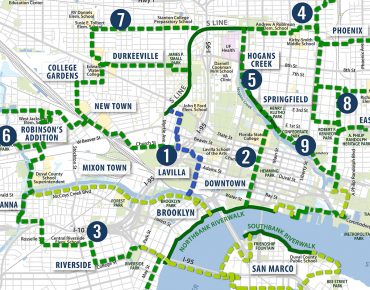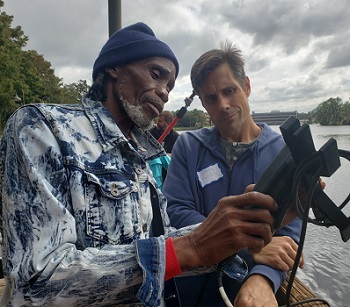 The next decade promises to be a period of revitalization and transformation for Jacksonville’s urban core. The construction of The Emerald Trail, expected to be completed by 2029, will link at least 14 historic downtown neighborhoods through 30 miles of trails, greenways, and parks. Additional investments in waterfront communities will address flooding risks in vulnerable communities and remediate the polluted waterways to create safer, healthier places to get outside. With over $30M in planned investments, the project has the potential to be a catalyst for social and economic development in Jacksonville.
The next decade promises to be a period of revitalization and transformation for Jacksonville’s urban core. The construction of The Emerald Trail, expected to be completed by 2029, will link at least 14 historic downtown neighborhoods through 30 miles of trails, greenways, and parks. Additional investments in waterfront communities will address flooding risks in vulnerable communities and remediate the polluted waterways to create safer, healthier places to get outside. With over $30M in planned investments, the project has the potential to be a catalyst for social and economic development in Jacksonville.
What makes this project particularly exciting is the collective commitment to ensuring that all community members benefit from these improvements and that revitalization doesn’t lead to displacement. To do this, Groundwork Jacksonville is working to ensure community voice is front and center in every stage of this project. As the community engagement coordinator, Gloria McNair is at the heart of this effort – building connections with the community, amplifying their voices, and ensuring the community is involved in everything from visioning to implementation and long-term stewardship.
Gloria recently shared with us some thoughts and lessons from her experience:
- Community engagement looks really different across organizations and projects. What does community engagement mean to you, and what does it look like at Groundwork Jacksonville?
Through my work in public health, I discovered that agencies would come up with grand ideas for a community and right away begin implementing the plan. A couple of years later, they’d be struggling to understand what went wrong and why it didn’t work. When you prioritize community engagement, someone may have this bright idea, but you don’t just go out and do it – you go to the community that will be impacted and ask questions. You explain your role and your vision, and you ask them what they want from the project. You ask for their input on your proposed ideas. You ask them what they would do differently. You can’t create something meaningful for the community without first asking the community — what is meaningful to you?
To me, community engagement is involving the residents in the planning and implementation processes, keeping them informed along the way, and letting them know they have a voice – that things don’t just happen to them – they have a voice in shaping what happens to their community and how it affects them. At Groundwork Jacksonville, my job is to be a voice and a partner for our community. I listen and learn from community members, keep our Executive Director informed about their priorities and needs, keep the community informed about the design and planning processes for the region, and create opportunities for everyone to get involved.
- Community engagement and involvement have become central components of Groundwork Jacksonville’s work on the Emerald Trail and other major land revitalization projects. How has community members’ input influenced these projects?

Community engagement is the reason it’s called the Emerald Trail. Originally the project was called the Emerald Necklace. At one of our community meetings, we specifically asked the 300 participants what they’d like the project to be called. They asked that we keep Emerald – as they felt it was a positive reflection of the neighborhoods – but asked that we call it the Trail. The name Emerald Trail stuck.
We’re working even more closely with community members on a project to remedy flooding and water pollution in the McCoy’s Creek Watershed Area. Residents have been at the table since the outset. They were able to inform the design of the trail, give input on the selection of amenities, and shape the vision for the future use of the space. With their input, the restoration of fishing areas emerged as a crucial aspect of this project. You can see people fishing all over Jacksonville, but McCoy’s Creek is contaminated and unsafe. Community members want to bring fishing back to their neighborhood, and that is now reflected in our plan.
- I’m sure the influence goes in both directions. How has the work of Groundwork Jacksonville been influenced through community engagement strategy?
Community engagement is one of the reasons we became more interested in environmental justice and equitable development. During the community engagement process, you learn what is really important to people’s lives. The McCoy’s Creek restoration project was started because the surrounding neighborhoods were experiencing frequent flooding. When the project started, community members came to me and said – that’s important, but right now, we have other problems that seem more pressing. They had learned to live around the flooding, and they were afraid that revitalizing the area would impact their ability to stay in the community. When they saw the designs, they saw a beautiful, green environment – and they couldn’t believe that anyone would let them stay there to enjoy it.
While they appreciate the big picture vision of the revitalization project, home repairs, employment, and crime reduction are more immediate and pressing needs. These conversations about short-term needs and long-term fears got us at Groundwork Jacksonville interested in learning more about equitable development strategies and how to prevent displacement. We were inspired to get creative about our own role in the community and pulling in partners to help meet the holistic needs of the community.
- By focusing on equitable development, Groundwork Jacksonville has broadened partnerships and launched new programs, but you can’t be everything to everyone. How do you continue building trust when you encounter something you can’t address?
This is something we’ve had to navigate since launching as an organization. We weren’t the first organization to come in promising to help the community. From the outset, there was a lack of trust because of this legacy of broken promises. We had to dedicate time to building trust and show that we were different than other organizations. I showed up and got involved consistently at community meetings and events. We created space for community members to have a voice at the table with design teams, city officials, and other partners. I made myself available and connected with residents on a personal level. My cell-phone is my work number. Community members can call me directly, and I can try to help find solutions to their concerns.

As an organization, we also focused on finding small, immediate changes that were in our control – like forming CREST, the Community Restoration Environmental Stewardship Training program, to provide employment and career training to community members and provide an opportunity for an intergenerational cohort to engage more deeply in revitalization projects. We started a community garden to address the concern over a lack of healthy, affordable food. People want to be truly heard, and they also understand that there are limitations. At the end of the day, what’s most important is that residents know we care deeply about our communities, that we’re helping where we can, and that this is just the beginning.
- What is your long-term hope for the community? What do you wish to build together?
I’d like to see all the residents within the Emerald Trail have access to a positive quality of life, good housing, employment, and education. I want them to be able to remain in a beautiful neighborhood where people care about nature and climate change and are working together to address problems. All of this within their neighborhood. I want everyone to have that opportunity.
Gloria McNair has been the Community Engagement Coordinator at Groundwork Jacksonville since 2018. She is a proud Jacksonville resident and has dedicated her life to service, public health, and environmental justice.
